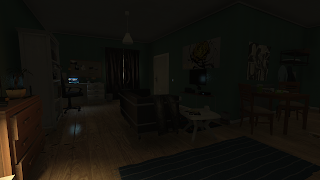A scifi successor to Amnesia
Aside from it being another horror game from Frictional, I did not know anything about Soma when buying it. Due to screenshots and it being tagged as scifi, I thought it took place aboard a spaceship or station. Thus my confusion was sizable when the game began in a mundane looking apartment in Toronto, Canada. Fairly soon it got to a more exotic location, though.
In Soma, a comet has hit Earth and decimated all human life except for a handful of people in an underwater research facility called Pathos-II -- a group of stations built to operate a mass driver that flings objects into space without rockets. How the protagonist, Simon Jarrett, ends up in the facility is one of the mysteries that unfolds as the game progresses.
Interesting theme
One of the big story elements is how technology has advanced to the point human consciousness can be scanned and simulated in a digital environment. Since their fates have been pretty much sealed, the researchers of Pathos-II find meaning in their lives by building the Ark, a satellite that has the scans of them living in a virtual world -- the remnants of humankind. However, as Simon soon finds out, the Ark has not been launched. He takes as his task to get it into space because it is the right thing to do.
Simon gets help from Catherine Chun, one of the researchers. They can only communicate via Simon's omnitool and only when it is docked. But when they do get to talk, it is great. The dialogue is interesting and thought-provoking. Jared Zeus and Nell Mooney did a great job as the characters' voices. It reminded me of Firewatch in which Henry uses his walkie-talkie to talk with Delilah.
Soma asks what is to be human. Is a perfectly simulated human consciousness without a biological body still human? I assume the game's name is somehow related to that. Soma and somatic come from the Greek word, σῶμα (/ˈso.ma/), meaning body.
Another aspect to the theme is created by the station's artificial intelligence, the Warden Unit or WAU, who is also responsible for most of the horror elements of the game. WAU is supposedly malfunctioning but I wonder if that is truly the case.
It was apparently tasked to preserve human life with wording that to me sounded like a command not completely thought through given the current situation. Maybe WAU decided that the only feasible solution to ensure the survival of Pathos-II's personnel (and humankind) would be to start mutating biological life to combine it with technology.
Great narrative
Of course this all has been explored in other media many times over before but doing it in a video game and this way is neat. You get to do a few moral choices along the way related to the theme. They probably affect nothing, couple lines of dialogue at most, but you do not get to do something like that in your standard movie or book.
Like Amnesia, Soma has audio and text logs for exposition. But the game also does a lot of showing instead of telling, which I found great. There is a lot of detail around to examine but you might want to turn off chromatic aberration before your eyes start to hurt like mine did. The setting can be found under game options named as color separation.
A walking simulator
Soma's biggest problem is the lack of gameplay. While I greatly enjoyed the game, there is just little reason to ever replay it. There are few puzzles and monsters to hide and run from but apart from that, Soma is basically a walking simulator. Playing it again would be like watching a 9-hour movie.
Sometimes I almost wished Soma was a straight-up walking simulator, though, as the some of the monsters parts felt poorly paced, dragging on too long. Or maybe the game was bad at communicating a threat still existed. I again mention Alien: Isolation but it is just really good with its pacing and how it tells if something is after you.













No comments:
Post a Comment